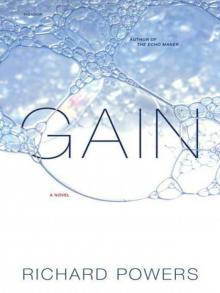- Home
- Richard Powers
Gain Page 5
Gain Read online
Page 5
As for these candles’ remarkable price, the answer was even simpler. Ennis had been systematically selling at a loss. He could not bring himself to ask more for his obsessive craftsmanship and superior chemistry than the going rate for inferior light. And he refused to do the math and see where business was taking him. The Clares did the projections for him. Had they not come along at that moment, Ennis would soon have been unable to make sufficient candles to cover the cost of his rendered fat.
The Irishman defended himself. He had been building up casks of the byproduct, olein. When the cash ran out, he planned to do something with his stockpile of red oil.
What? Resolve asked. Make a perfect soap that you could go and sell below cost?
Yes, Ennis insisted, without saying anything. Lose money honorably, until some wealthy backer came by and salvaged him.
—From A Tale of Soap and Water: The Historical Progress of
Cleanliness, by Grace T. Hallock. Copyright 1928, the Cleanliness
Institute. (“Review copies free to school administrators. $12 per
100 in lots of 25 or more.”)
Soap appealed to Samuel because it put the purchaser next to godliness. Resolve liked it because the purchaser used it up.
Scavenging what they could from the North End candle works, the brothers and their Irishman rebuilt the workshop on a larger scale. They moved the equipment out to Roxbury, closer to supplies of rendered fat. The new factory combined candle-and soapmaking, feeding the scraps of the one to the other’s maw.
Resolve and Samuel commissioned a huge, iron-bottomed soap kettle. They built the best crutcher, tanks, frames, and drying racks they could. All three men scorned false economy, each for his own reason. Profit depended on the efficiency and quality that only superior equipment would give.
The plant’s dedication was a select affair, involving just the three of them. Ennis allowed himself half a flute of the christening champagne and sang a song his wife had loved, called “May Fortune Smile.” Samuel prayed for the Lord’s benediction, then set a modest production goal for year’s end. Resolve, surveying with pleasure the first fruits of their labor, looked out over the new equipment and cackled a joke about Mrs. Whitney and her husband’s interchangeable parts.
Saponification was a complex affair, a delicate marriage of science and idiosyncrasy. The four-day boiling process involved much poking, prodding, and tasting on Ennis’s part. He determined the exact ratios of lye to red oil with a mix of algorithm and whim. He killed and caught the stock, steering the kettle back and forth between alkali and fat the way the old Clare captains navigated the Strait of Magellan.
He gauged the soapy strings adhering to his stirring paddle, awaiting the exact moment when the soap grained and salted out. He cut the steam and drew off the salt lye and glycerin, letting his broth set like a temperamental soufflé. He lyed and boiled, boiled and lyed, awaiting strong change, the moment when the mass turned transparent and became another animal.
When the curds rose up like polar bergs, he cooled the mixture for several days and again decanted it. The batch settled into a parfait of soap, caustic nigre, and sedimented lye. In this standing rainbow, each crudeness floated to its own level. He skimmed the soap off the surface like scum off a pond. He washed off the impurities, pitched and finished the purified mass.
Until this point, he let no Clare near the broth. One cook: that’s all that the world itself had taken. One skilled pair of eyes and hands, one nose, one tongue. Out of the kettle and into the crutcher, the soap became public domain. Only then did Ennis trust the others to mix and frame and dry and slab and cut. For by then the recipe was done.
The resulting slabs were a mystery to behold. Here was a substance, grease’s second cousin. Yet something had turned waste inside out. Dirt’s duckling transformed to salve’s swan, its rancid nosegay rearranged into aromatic garland. This waxy mass, arising from putrescence, became its hated parent’s most potent anodyne.
To make their first run, they paid cash for a quantity of fine rendered fat. Thereafter, they sought suppliers who would trade good tallow for excellent soap, a pound for a pound. As their process made two pounds of soap for each pound of introduced fats, they would have half their run left over to pay for alkali, keep the equipment repaired, and put bread on their own tables.
Only when Resolve gazed upon that first readied ton did he consider their odd position. Their own customers would be their chief competition. Caked soap was still an expensive substitute for the slippery paste that every home could yet make as a matter of course. The Clares’ soap had to teach thrifty New England how smelly, difficult, and undependable home soapmaking had always been.
To distribute their wares, Samuel and Resolve resorted to their old handlers. But these ancient family associates turned a deaf ear to the fledgling firm. The distributors knew the Clare family only as good merchants. Not one trusted such a late-day change of life, this willful descent to the mechanical ranks.
Weeks passed while the three men waited for some jobber to step forward and purchase any chunk of their stock, even on credit or commission. Desperate, Samuel drew up, at his dinner table, a crude advertisement which he ran in several trade circulars as well as the Boston Directory. The square of print bore much the same message as the wooden sign that hung upon the side of their shop:
J. CLARE’S SONS
JUSTICE AND SPRING STREETS, ROXB.
2ND DOOR NORTHWEST
MANUFACTURER & WHOLESALER OF ALL IMAGINABLE
SOAPS AND CANDLES
UNGUENT TO CLEANSE THE MULTITUDES LIGHT TO LIGHTEN THEM
HIGHEST PRICES PAID FOR TALLOW
Chemistry is the art of separating mixt bodies into their constituent parts and of combining different bodies or the parts of bodies into new mixts . . . for the purposes of philosophy by explaining the composition of bodies . . . and for the purposes of arts by producing several artificial substances more suitable to the intention of various arts than any natural productions are.
—WILLIAM CULLEN, c. 1766
Whole lifetimes went by, with no sign of a sale. Ennis told the Clares they must lower their price. Resolve pointed out that no purchaser had even gotten close enough to inquire about pricing.
The afternoon of their first buyer, Samuel manned the shop alone. With the modest warehouse already threatening to burst, Ennis and Resolve had gone off to an ashery on the south coast, to secure potash at a good, bulk price.
Seeing a visitor after so long a drought, Samuel naturally assumed that the man had wandered in off the street to ask for directions. As it happened, the fellow actually did want soap. But he wanted a pitiful two pounds.
Samuel very nearly told the man his mistake: this was a manufactory. They dealt only in quantity. But given the trade until that date, two pounds was quantity. In the end, the gaping future suggested to Samuel that it might be wiser to go ahead and hack off a paltry piece from the slabs out back and proffer explanations later.
He wrapped the cut chunk and took the man’s pittance. Only then did the customer ask to have the soap delivered. Samuel faltered, tried to pretend that delivery was a matter of course. The customer gave him a name and a street address. The street was in Charlestown, all the way across the water.
Truly God meant to sport with this enterprise. Samuel closed down the shop and spent the rest of that afternoon shepherding the anemic chunk to its destination. He could not, at first, find the obscure house, and so did not acquit himself of his delivery until nightfall. With riding expenses and lost shop time, that first sale cost the shop more than the costliest of Ennis’s retail excursions.
Not long after, a prominent grocery factor, Matthew Fox, paid a visit to Justice and Spring Streets. He thanked the Clares on behalf of his cousin in Charlestown for what appeared by all accounts to be a very passable soap for both laundry and personal use. And well delivered, too, Fox winked at Samuel. He then placed a trial order for a thousand pounds of candles and a hundred for
ty-pound boxes of soap.
The Clares filled the order from inventory without problem. And with each crate that began moving out the door, word of the crates’ contents shipped as well. Other factors and jobbers followed. But the Fox orders always remained privileged.
Another profit followed from that first commission. Samuel’s eye in time settled upon the factor’s daughter, Dorcas Fox. A suitably long courtship converted love into its market equivalent. Samuel married Dorcas, joining the Roxbury firm to its factor’s family: the dowry of vertical integration.
Resolve, ever skilled with the books, calculated the total loss of Samuel’s half-day junket to Charlestown. He prorated and projected. At last he declared that the service had left them a solid five cents in the red for that day. He mounted five large cent coins in an expensive oak frame. And for as long as he lived, on the wall of each subsequent office he in time occupied, Resolve Clare hung this framed keepsake, the five lucky cents the company had lost forever, in the course of that first sale.
Ninety-eight percent certain.
When Ellen reports the probability to her father, he flies off the handle.
“What do you mean, ‘Ninety-eight percent certain’? Certain of what?”
“Search me. Certain that it’s a cyst.”
“That it’s . . . ? You mean they don’t even know it’s a cyst? This is total idiocy. I thought they said—”
“Okay, okay, Daddy. It’s a cyst.”
“Then ninety-eight percent what?”
“Percent sure.”
“Percent sure of what?”
“Stop harshing on me, Daddy.”
“Harshing?”
“Don’t yell at me. I didn’t do anything.”
“I’m not yelling.” Furious, because he doesn’t even know who to be angry at.
“I’m not yelling. Sure of what?”
“I don’t know. Sure that everything’s gonna be cool.”
“Well, why didn’t they just say everything’s going to be cool?”
“Because . . . how should I know? I knew I shouldn’t have told you anything. Mom didn’t tell me to tell you, you know. I could of just lied to you. Made something up. Would that have made you happier?”
“All right. Don’t get excited. Don’t get excited. Just tell me one thing. Was it someone at Mercy who told your mother that number? Did they say ‘ninety-eight,’ or was that just an estimate she told you guys, based on what the doctor—”
“Dad. I’m gonna scream. Know what that means: ‘scream’? Just leave me—”
“No, I won’t just leave you—”
“Just forget it. Okay? Lose it. It’s only a number. It doesn’t mean anything.”
Her mother’s head for figures. “It means—”
“It means they’re saying the operation’s not a big deal. So don’t turn around and make a big deal out of their saying that it’s not gonna be a big deal.”
“That’s supposed to make everybody feel good? Ninety-eight percent?”
Ellen storms from the room. Don doesn’t bother to stop her. She can’t tell him, anyway. Can’t explain to him why doctors stoop to saying such crap. They say it because they think it comes across as some kind of professional reassurance. Cheerful, meaningless, and unprosecutable. That’s what you get when your whole health care business is driven by fear of malpractice. They can’t say Shut up and relax, as in the old days, because Suzy Homemaker has become Susan Super Health Care Consumer, and won’t accept a professional’s word as answer.
There’s a woman gyny involved somewhere. Why not ninety-seven? Why not ninety-nine and forty-four one-hundredths? At least then the prognosis might float.
With Laura’s head for statistics, it’s completely possible that she doesn’t realize that 98 percent means that “certain” is going to be wrong one week out of every year. Means that two people out of every hundred are going to come out of the procedure on a platter. Worse odds than going to ’Nam was.
It figures. The Laura that Don met, two decades ago, was a mathematical midget, an absolute arithmetic microcephalic. She could divide two numbers and not be surprised when the result was bigger than both numbers she started with. The woman couldn’t even figure tips. Not even 10 percent, even with a good wind at her back. He tried to show her. But she just claimed that decimal points made her nervous.
When she wanted to get a job, Don helped her. They didn’t need the money; he was doing fine. But she needed something, just to feel good about herself. He looked up tons of jobs she could get into without too much fuss. He drew up entire lists for her. Real estate, she finally decided, out of pure perversity. Just to be contrary.
Laura, he told her. Get real. Square feet, carrying costs, taxes, financing, percentage points, amortization. She’d be wretched. Worse off than she already was.
She insisted she’d be fine. Laura knows best. Always.
Of course she bitched and moaned throughout the whole year she sat in that damn school. What in God’s name is a logarithm? How do you compound? But before he could even get out half of the answer, she’d start laying into him. Finally he had to quit helping altogether.
Then, of course, she had to trot out all the large-caliber emotional guns. The silent treatments at home and the shouting matches in front of their friends. Turns out he was always a controlling and manipulative personality. From the start, secretly trying to dominate her, run her life.
He put up with the antics for the time it took her to get the certification. He figured she’d get sick of it, give up, and choose a more realistic profession. But against the astronomical odds, she actually started to get the knack of calculation. Little gold stars on the homework. She graduated in the top third of her group.
How many honor students does that make in all? he teased her, for old times. To lighten things up. And she even smiled at that one. But about a month after graduation, the feces really hit the turboprop. She put on the little Millennium jacket, hung out the shingle, and discovered that she actually liked all that calculation crap. Hey: it’s true what those public service commercials are always saying. Numbers are our friends.
She told him that all the trouble she’d had with adding and subtracting up until then might have been his fault. He never let her do any of the household computations. He always tried to protect her from the mortgage and the monthly statements. He kept the 1040s all to himself, every year, never let her near them.
He asked her why in hell he would have insisted on sweating out a Schedule A by himself if he thought for a second that he could stick her with half of it.
Because numbers were power, she told him. He made math seem harder than it really was. All these years, telling her she couldn’t calculate, in order to cripple her and preserve his monopoly on decisions.
Yet for someone so badly crippled, she recovered nicely. Her grasp of figures in court had impressed him. When it came to the algebra of shafting, Laura was MIT material.
All right: so she can count to forty-two. So she can compound forty-two at .00274 percent per annum, ad infinitum. She knows that forty-two doesn’t have to be old. But she has let herself get old. She’s a half century if she’s a day. And it’s her own damn fault.
She lives wrong, from block to tape. From hair spray to toenail polish. If she paid attention to half the things he’d told her over their fifteen-year relay race to hell, she wouldn’t look like her own mother already. He’d like to see her figure out the annual rate at which her weight’s appreciated, since Tim’s birth. Talk about your balloon mortgage.
He’s four years her senior, but nobody ever thinks so. Their friends were always surprised, when they told their ages in public. He’s kept himself up. That’s the difference between them. Cross-training. Antioxidants. Halve your calorie intake and eliminate your saturated fats.
To Laura, health is an abstraction. “Why do you waste your time with all that running? How many miles do you want to go? Aren’t you going to get there one of these days?”
/>
No good trying to tell her he does it for his health. He once tried to explain it to her, using statistics. Never again. You can’t change your number coming up, she just kept saying, no matter how many times he tried to say no, but you can change your number.
Now this cyst thing. In the end, you run out of evidence that doesn’t sound like “I told you so.” Not that she’s brought it on herself. But you do have to take responsibility for what happens to you. To pay the check for the meal you’ve eaten.
That idea always eluded her. All fatalism to her. Sparrows falling. He tried to put it to her in her terms. Your flowers do better when you water and fertilize them, right?
“Some do. Others don’t require fertilizing, Donald.”
He tried to say he wasn’t talking about fertilizer. He was talking about basic effort. Preparation.
She countered with her typical contrary bullshit. “Some plants do better than others, no matter what you do.”
She probably thinks that 98 percent means 98 out of 100 people having partial hysterectomies are going to be fine, regardless of their surgeon or anesthesiologist or level of post-op care. She’s probably done nothing at all to see who’s cutting on her. Probably hasn’t read a single word about ovarian cysts, or taken the first step to see if her gynecologist knows what the hell she’s doing.
Don waits until Ellen leaves for her dance orgy and Tim heads out to his weekly Internet group crack session. Then he calls the hospital. Makes up some fumbling excuse about insurance company questions and misplacing the papers. He says, “This is Mr. Bodey.”
When the receptionist asks, “Oh, you mean her husband?” he just grunts.
Despite Laura’s total laissez-faire attitude toward her own life, everything does seem to be in order. The tests all indicate a benign fibroid mass on her right ovary. No biggie. A quick incision and sayonara.

 The Overstory
The Overstory Bewilderment
Bewilderment Three Farmers on Their Way to a Dance
Three Farmers on Their Way to a Dance Operation Wandering Soul
Operation Wandering Soul Prisoner's Dilemma
Prisoner's Dilemma The Gold Bug Variations
The Gold Bug Variations Generosity: An Enhancement
Generosity: An Enhancement The Echo Maker
The Echo Maker Orfeo
Orfeo The Time of Our Singing
The Time of Our Singing PLOWING THE DARK
PLOWING THE DARK Generosity
Generosity Gain
Gain